When it comes to video games, talk about communities more often deals with players than what we’re playing onscreen. As I tinkered with Far Cry: New Dawn for a couple of hours during a play session last week at Ubisoft in San Francisco, my biggest takeaway was the clash of cultures happening between the open-world spinoff’s three factions. I’ve been thinking about the interplay between communities ever since.
It turns out Ubisoft’s spent a great deal of time thinking about communities as well.
“A pretty long time. I was part of the narrative team on Far Cry 5, and we thought a lot about it then,” said Olivia Alexander, the narrative designer and scriptwriter for Far Cry: New Dawn. “We had to.”
New Dawn builds off the nuclear bomb ending of Far Cry 5. Hope County wasn’t the only place dealing with devastation: a calamity of some sorts (Ubisoft isn’t saying what happened yet) wiped out much of humanity. Yep, it’s Far Cry: Post-Apocalypse. You’re part of an effort to protect people and restore society, and as you come to Hope County, you find three groups of people trying to live together … and not always peacefully:
June 5th: The AI Audit in NYC
Join us next week in NYC to engage with top executive leaders, delving into strategies for auditing AI models to ensure fairness, optimal performance, and ethical compliance across diverse organizations. Secure your attendance for this exclusive invite-only event.
- Survivors are Hope County residents who lived through the nuke.
- The Highwaymen are a group of land pirates: marauders who live for today, not tomorrow.
- New Eden: Joseph Seed’s cultists are still around, but they’ve changed now that they’ve been proven right about the end of the world.
“The way I prefer to break it down: The three communities are all diametrically opposed because one lives for today, the Highwaymen; one clings to the past, the Survivors; and one looks to the future and make something unrecognizable, New Eden. All of these things are diametrically opposed, and which one of these things can really work besides the other. As we evolved the story and communities, the thing we realized is that living for today is resistant to planning ahead or living with much reference for the past.”
Alexander has worked at Ubisoft Montreal for three years, contributing to the stories for Far Cry 5 and Assassin’s Creed: Odyssey. She’s part of a five-person scriptwriting team behind New Dawn, which includes creative director Jean-Sebastien Decant, narrative director James Nadiger, and Marri Knadle.
“We are the village that raised the baby in terms of narrative,” she said.
Alexander and I talked about Far Cry: New Dawn for about 20 minutes last week. Here’s an edited transcript of our interview.
After the bomb
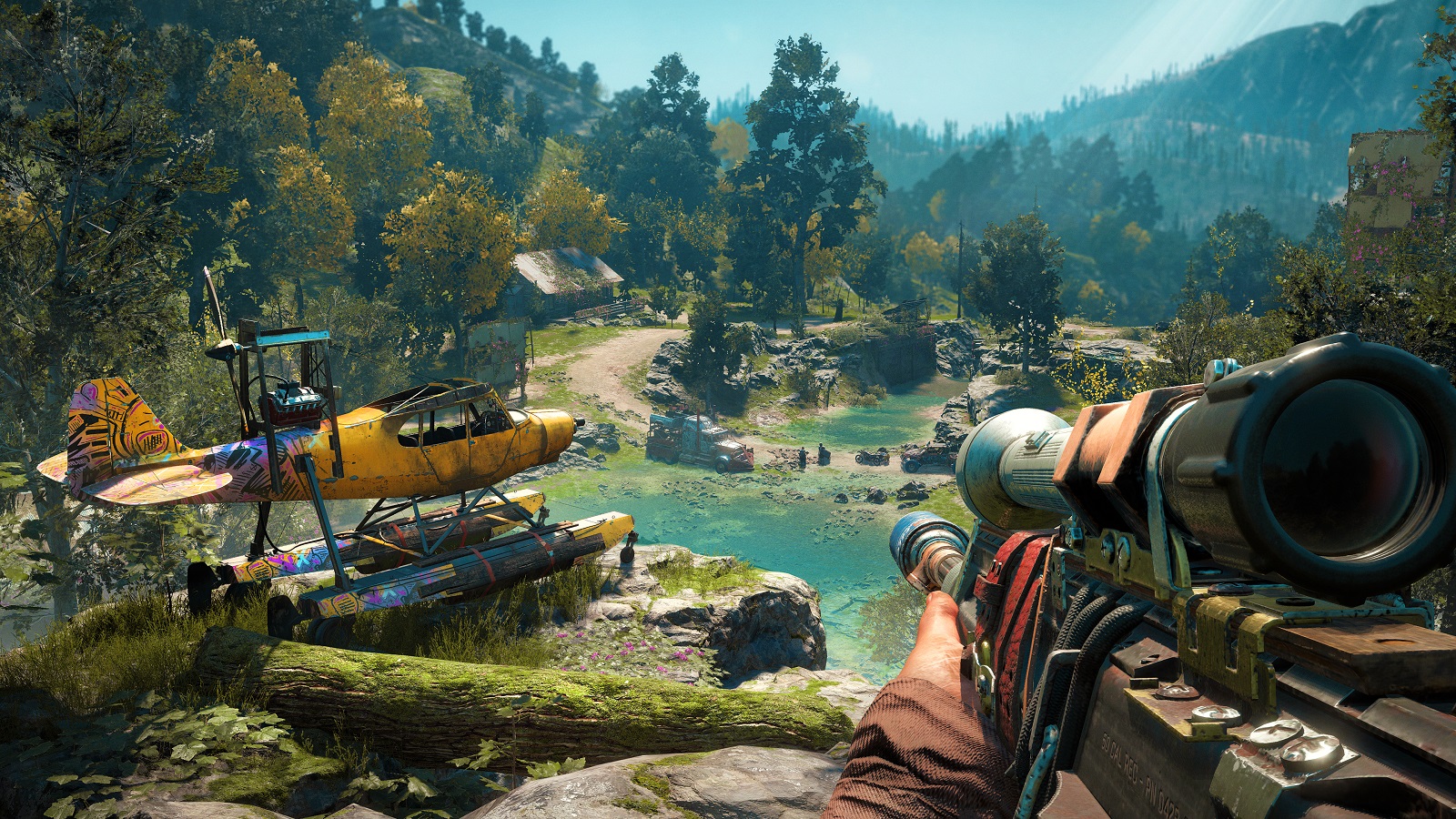
Above: That floatplane can’t fly, but it cruise down the road! Or the river.
GamesBeat: What do you mean by “baby”?
Olivia Alexander: We [as a narrative group] shared a lot of ownership of a lot of things. For example, a lot of stuff in the open world, we all helped out on. There are specific missions that we wrote, specific characters that we were the caretakers of, specific beats we were the caretakers of. My colleague, Marri, had a lot of conceptualization of New Eden. I had a lot to do with the conceptualization of the Highwaymen and The Twins.
GamesBeat: I thought there was only one nuclear bomb. The whole world’s gone to hell?
Alexander: There was a lot of chaos after the initial explosion at the end of Far Cry 5, and it would be very difficult to know what happened to the rest of the world during that chaos. Our setting of Far Cry: New Dawn dictates just that: that there was a global event, and that event in the middle of that chaos was the very beginning of a chain reaction that sparked all over the world.
GamesBeat: Did Russia launch nukes? Something like that?
Alexander: The narrative team did a lot of research as to what would happen both mainly on a global scale in terms of population, geography, weather patterns, that kind of thing. We made up our own world scenario and consulted meteorologists to figure out what those side-effects would be. Those two experts specialize in both volcanic activity and nuclear activity and the potential fallout of those things, and that scientific data really informed our creative process and how we evolved Hope County in the setting of Far Cry 5 to Far Cry New Dawn
GamesBeat: Why use a global calamity as the background for New Dawn?
Alexander: We knew on the Far Cry brand that we wanted to have a post-apocalyptic setting for quite a while and the ending of Far Cry 5 led to that very organically. Early concepts for Far Cry: New Dawn was happening as Far Cry 5 was winding down, so it was a very easy hop-skip-and-a-jump from one to the other.
GamesBeat: Why does the Far Cry narrative team want to do a post-apocalyptic narrative when so many others have already done so?
Alexander: We wanted to do it because Far Cry has had its own brand of storytelling style, humor, drama, that sort of thing, and we felt we could do it well. We wanted to explore these themes, both visually and new themes narratively.
GamesBeat: What’s a new theme you’re exploring here that you won’t find in Rage, Fallout, or Metro?
Alexander: One of the really cool things that we explore is how different generations view change and how they deal with it as both individuals and units. Carmina [Rye, the baby born toward the end of Far Cry 5] sees the world in a completely different way than her parents do. Her parents see a decimation of culture, infrastructure, life, lifelessness; and Carmina sees a world full of life, full of new beginnings — full of new adventures, things that she’s never seen before. Great stories of old, mythical things. Almost a world of magic, even in a world of quite a lot of hardship.
And that’s true in terms of generational things for each of our three factions, because we have Carmina’s metaphor in the survivor faction. In the New Eden faction, how the new members of the cult see the world is evolved and different from how Joseph Seed saw the world, and how he has been changed by the collapse. And even the Highwaymen, how Mickey and Lou see the world is different from how their father, who watched the bombs fall, saw the worlds. The Twins are shaped by how the world has evolved, and their father is shaped by how the world was before. The idea that different generations are seeing this huge, huge shift and change in the world differently is something that I think people can get behind.
Generational gulf
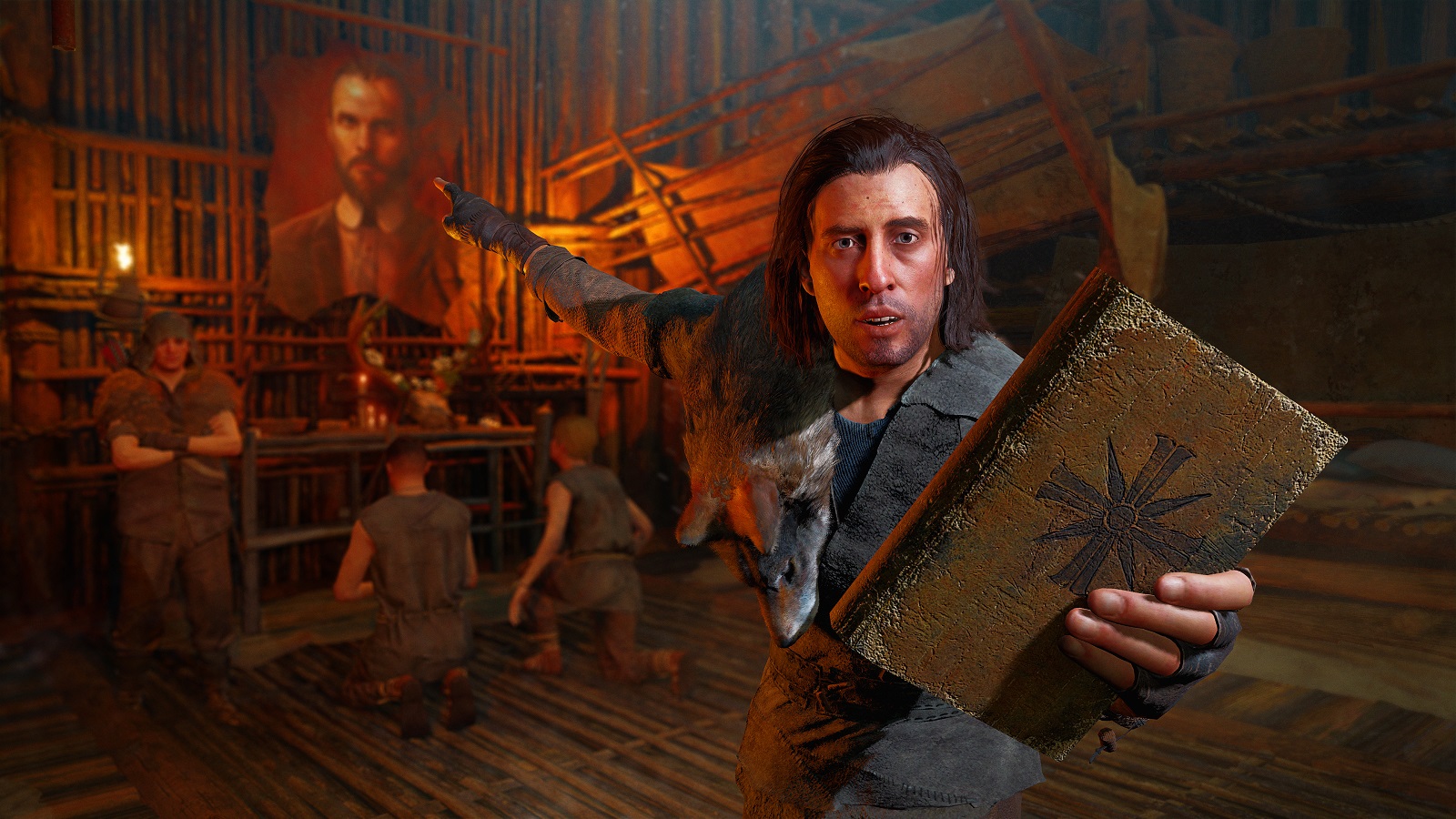
Above: New Eden has turned a new leaf.
GamesBeat: Grace, an older black woman who’s also a mentor to Carmina and an ally to the player, embodies this shift as well, doesn’t see?
Alexander: She does. She’s someone who saw both sides.
GamesBeat: But her shift is different than Carmina’s parents. Where they are lamenting what was lost, Grace says to Carmina’s generation, “Now it’s your turn, your generation’s turn” to do something with this.
Alexander: Exactly. She’s an example of someone of Carmina’s parents generation whose opinion is different. She looks at Carmina — she taught Carmina how to shoot — she sees how she has grown. She looks at Carmina and sees her as a walking metaphor for the new growth in the world. Something that was so delicate and scared, or something that people were scared for, not that she was scared herself, and how Carmina has become this very confident, indomitable, and self-aware force. She sees and thinks that if Carmina can bring herself up, even if I’m going blind and don’t have too much longer to go, she’s going to be OK, so even if the world is different, Carmina will be OK, and that’s fine.
GamesBeat: Hence the “new dawn.”
Alexander: Yes, exactly.
GamesBeat: Why three different poles here: the Highwaymen, New Eden, and the survivors. Would there be enough to do survivors vs. Highwaymen? Why throw in the cultists?
Alexander: The cultists had woven their way so intimately into Hope County, had been so overtly preparing for some kind of thing like this, it would be remiss of us as a narrative team to make out like they were no longer here, not without some iteration or evolution of them. The Highwaymen represent this idea that other people on the continent survived as well. Basically, as it pertains to Hope County, New Eden, Highwaymen, and survivors all represent different philosophies that people in that situation from all over the country can identify with.
For example, if you saw the world blow up in smoke, you’d want to be part of a faction that never wanted to see that happen again, that wanted to throw away everything that led up to that, and you’d join New Eden. If you saw the world go up in smoke, and all these things that weighed you down, all these rules and expectations, if you never wanted to see those ever again, and you’d thought you’d die at any moment, you’d join the Highwaymen. If you saw the world go up in smoke, and you missed how things were, and you wanted any semblance of how things were again, some kind of comfort or familiarity, you would go to the survivors.
This idea that after such a traumatic event, anyone could go feasibly anywhere, even if it’s unbelievable now.
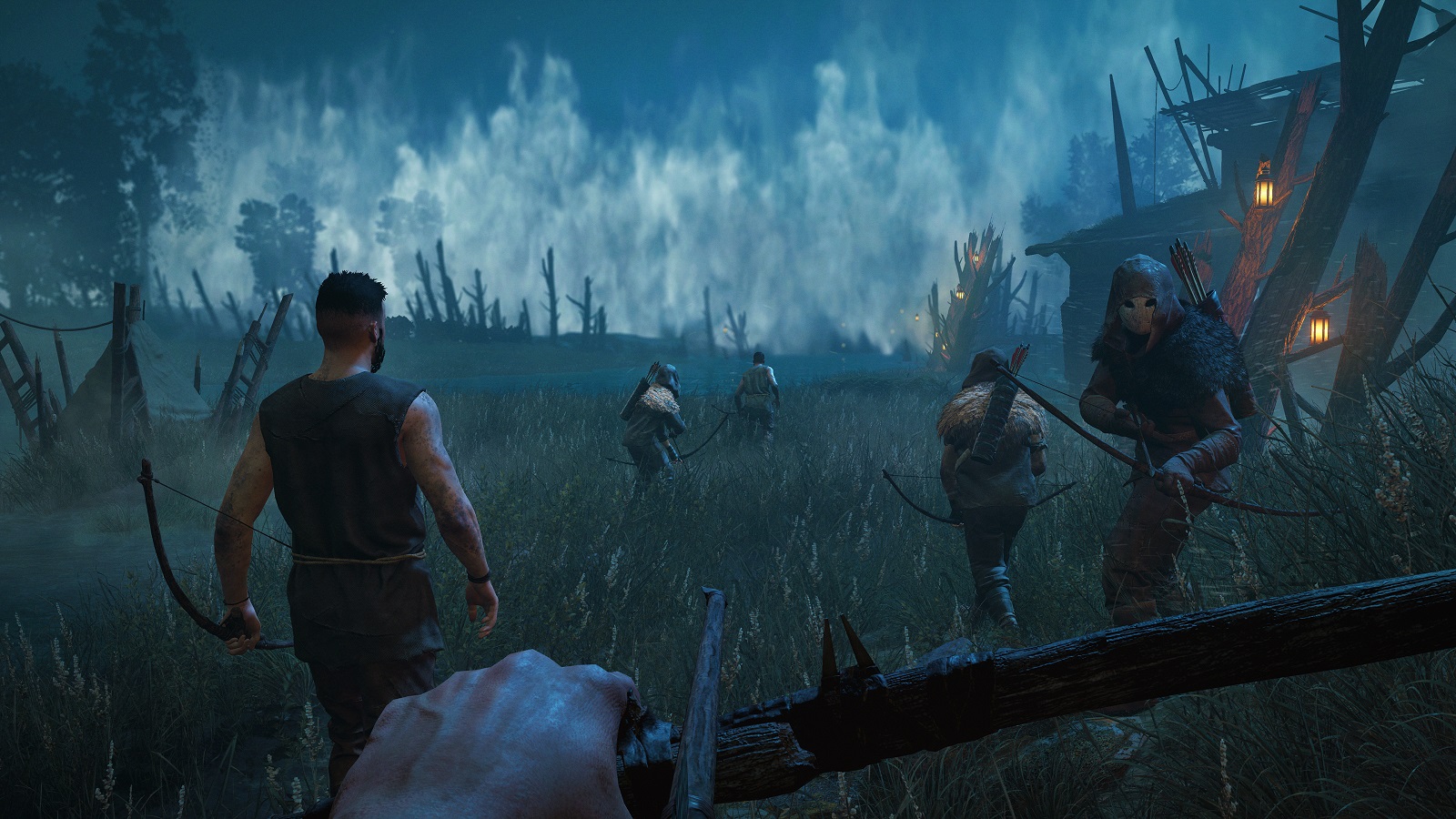
Above: New Eden are now tree-hugging hippies with bows.
GamesBeat: The followers of Seed were looking forward to the end of the world, and it’s come. Has it broken them, or has their philosophy evolved?
Alexander: The philosophy has certainly evolved. They’ve looked at all the things that Joseph Seed said cause this: materialism, technology, that kind of thing — and they rejected it. They burned everything from the old world: They burned old media, movies, TV, automatic rifles. They no longer use guns and only use bows-and-arrows; they wear hides on their skin. They farm the land. They use water wheels. They’ve gone back to the earth, back to the most simplistic way of living. They reject all outsiders and still see them as sinners. They believe themselves to have been right, and they no longer feel the need to coerce other people to join them, because as they see it, this is inherited land for them.
GamesBeat: So it’s a “new dawn” for them as well.
Alexander: It really is.
Highway to hell
GamesBeat: How’s it a “new dawn” for the Highwaymen?
Alexander: It’s a “new dawn” for the Highwaymen because initially, they were founded by Mickey and Lou’s father. He was the leader of a crew of dockworkers, and when everything went up in smoke, he had the most supplies at the docks. The most of everything: food, water, medical supplies. And he sort of ruled the city they were in on the East Coast.
GamesBeat: It could be like a Baltimore, a Philadelphia, but you’re not saying where.
Alexander: That’s about it. The idea is canned food goes bad after three years. Gasoline goes stale after three years. Eventually, you can’t stay in the city any more. So he took a trip on the road, and for the first several years, things were really, really bad. The Twins were coming of age, and they were with him, and they watched the sun come back. They watched flowers come and grow again, they watched rain started to fall, and they watched things improve. Still, as they were going, their dad was like, “Tighten your belts. Scrimp and save. We’re going to die at any moment. The Twins were like, sure, we’re going to die at any moment, so why do we have to scrimp and save? Why do we have to tighten our belts? You’re telling us not to eat our steak today, because you’re telling us we might need it tomorrow, but I want to have my steak today, and if I don’t have one tomorrow, I’m just going to take yours.
The idea is, they started to see the world filled with two kinds of people: problem-solvers and problem-makers. Their dad became someone who made a problem, and they solved it. So that’s when the Highwaymen expanded into chapters all across the country. That’s when they became loud and bombastic, these peacocks, these people who are here for a good time and not for a long time. They’re living for today only, and that, for them, is a new beginning.
GamesBeat: Are they the embodiment of the Baby Boomers in that way, because they didn’t plan ahead, and it’s up to following generations to solve their problems?
Alexander: They were just children when the bombs fell, so if you want to get really technical, would’ve been children right now. They’re living in a very post-Baby Boom world. The idea that humanity is defined by these big booms in population isn’t relevant anymore, as 88 percent of the population is gone.
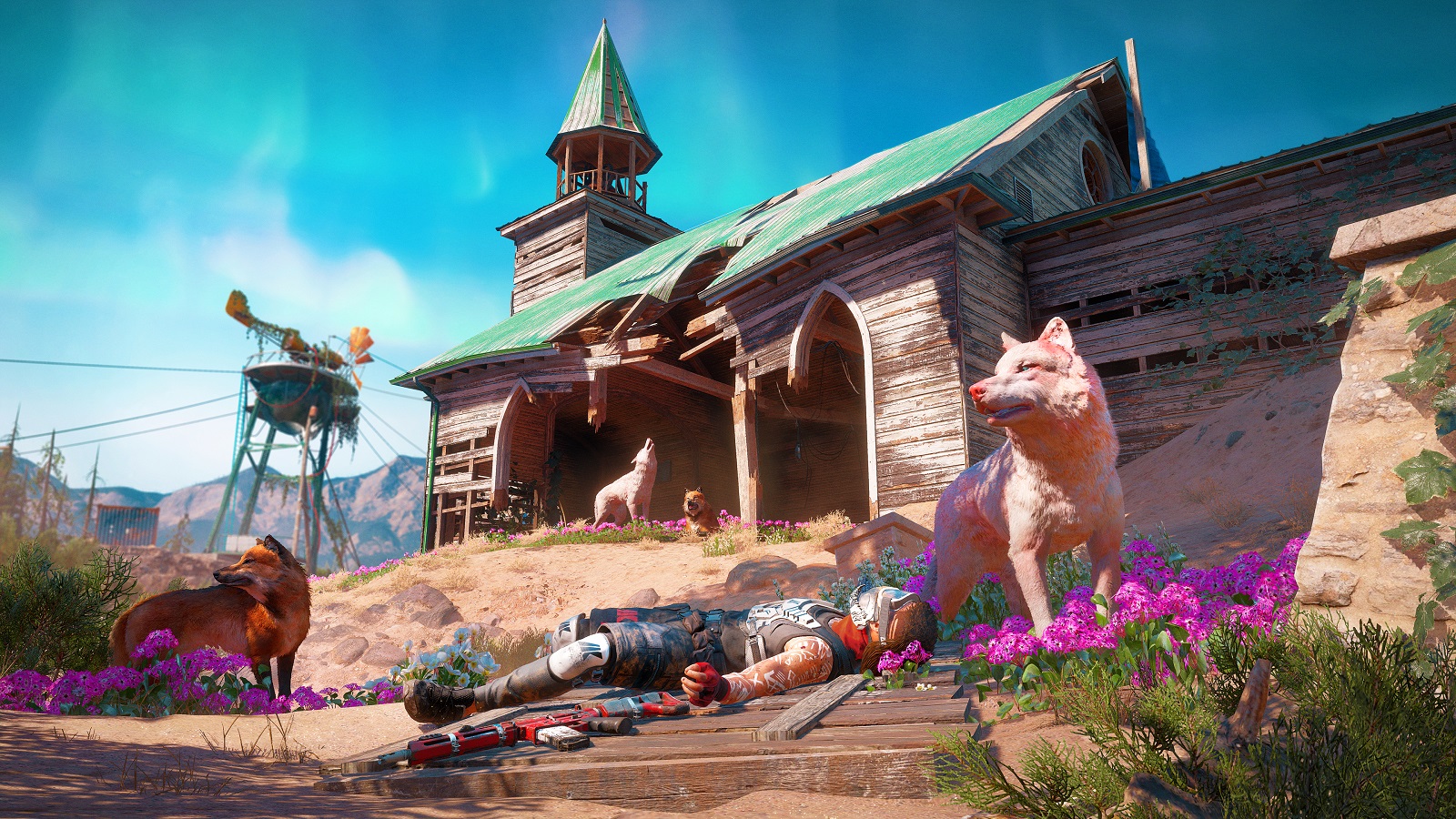
Above: This church has gone to the dogs.
GamesBeat: I was talking more of the writing team’s metaphor for the Baby Boom, how they take and take and don’t think of tomorrow?
Alexander: That’s not a metaphor we went with. We went more with kind of a metaphor, when you look at world that’s been destroyed, are you going to just enjoy yourself before you die, or are you going to plan for next week? Some people just want to enjoy themselves because they’re pretty sure they’re going to die.
GamesBeat: So they’re hedonistic?
Alexander: They’re hedonistic, and they’re also nihilistic. Rather than God is dead, let’s lie on the floor and cry about it, they’re like, “Hey, nothing matters! Let’s have a party! Nothing matters.” There’s no pressure, and that’s attractive to a lot of people, so that’s why they have such force in numbers.
GamesBeat: It’s not so much about power over others, is it?
Alexander: Power gives them other things: better gear, better weapons, food. It’s about what the power brings them.
GamesBeat: It’s not just wanting power.
Alexander: It’s a parallel side-effect: They want the power because they want the things.
GamesBeat: It’s not because they want the power to have the power, to conquer?
Alexander: Mickey and Lou’s motivation is more nuanced than that. They’re keen on providing for their own people. They’re providing for themselves primarily and keeping their people happy. They’re more like land pirates, because they’re also a little bit egalitarian — the idea is that all the loot they take, half the loot is for the group, half the loot is for you, the individual. You get to keep whatever you steal as long as you give a little bit to the pile in the middle. So they still know they’re running a community of sorts, but they also want to make sure the community stays together, even if they’re chaotic and crazy.
Clash of communities
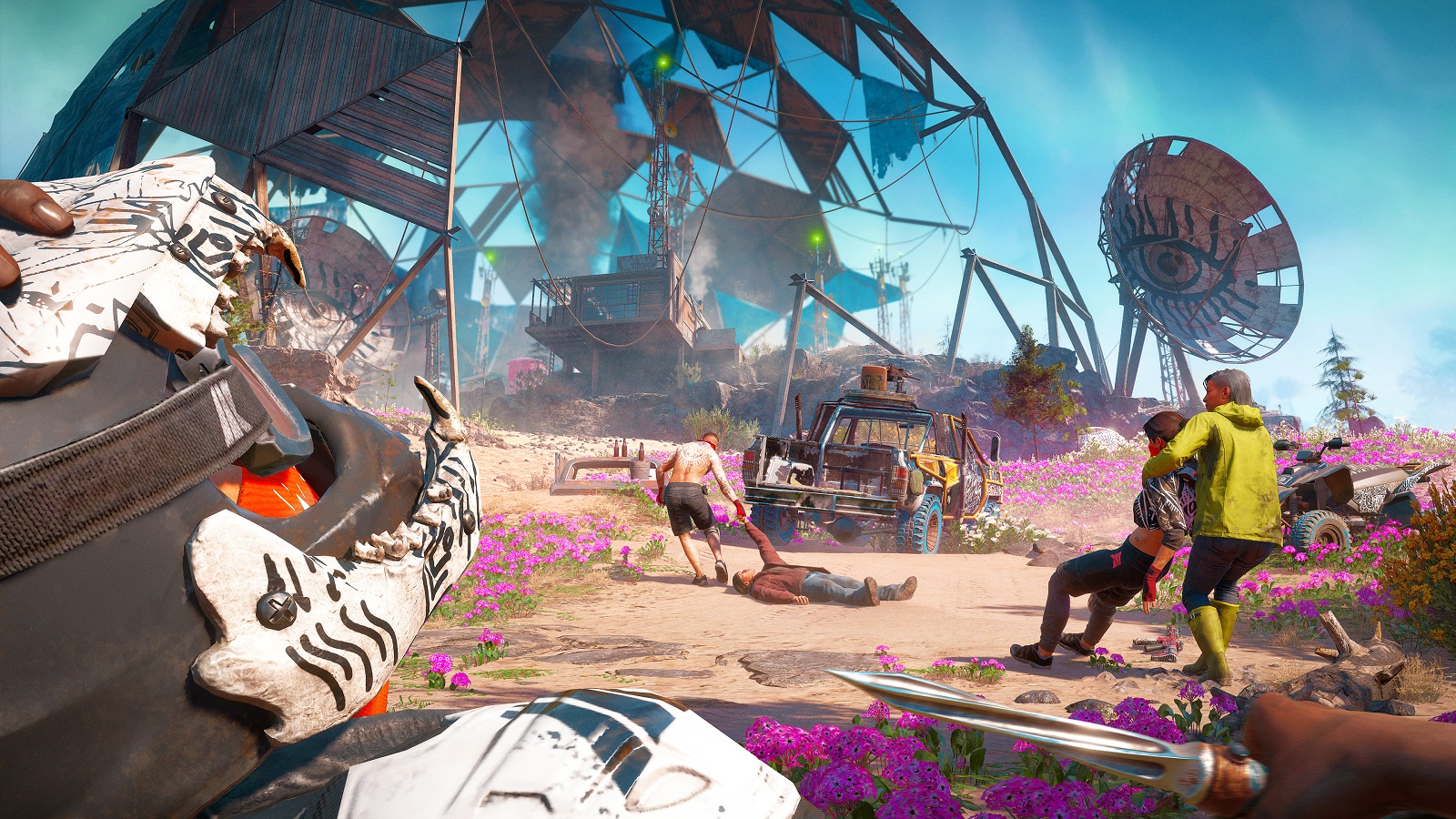
Above: Takedowns help you manage the Highwaymen.
GamesBeat. One of the aspects of Far Cry 5 was the clash of two communities. Here, we have the clash of three communities. How long have you been thinking about how communities work and interact?
Alexander: A pretty long time. I was part of the narrative team on Far Cry 5, and we thought a lot about it then. We had to. The way I prefer to break it down: the three communities are all diametrically opposed because one lives for today, the Highwaymen; one clings to the past, the survivors; and one looks to the future and make something unrecognizable, New Eden. All of these things are diametrically opposed, and which one of these things can really work besides the other.
GamesBeat: Why are The Twins African-Americans?
Alexander: The world has really been changed by this whole event, and we knew from the get-go that we really wanted to have a female villain, and we knew eventually that we wanted to have twins, so when we were casting for The Twins, we had an open call.
We had people who were biologically twins. We had two actors — we would always audition actors in pairs — and when we got Cara Rickets and Leslie Miller, they had incomparable chemistry together. They knew the characters really, really well. They were charismatic. They could switch roles at a moment’s notice, giving one the center of the scene and then director called for it giving the other the center of the scene. They were far and away the best qualified for the role.
GamesBeat: In the past and today, white supremacists make the accusation that African-Americans and black people in general are hedonistic and don’t think about the future. Has that worried anyone on the design team that you’ve made two African-American villains who aren’t thinking about the future?
Alexander: Primarily, when we write our villains, we write them to be fully three-dimensional people. That’s our priority. The idea that anything would stop us from doing that wouldn’t be Far Cry’s respect and reference for our villains. We had to be able to write them as three-dimensional villains who are scary, who are intimidating, otherwise it would be a disservice to us as both storytellers and our fans. We always make sure to write our villains with the utmost respect and full depth that makes a good villain, and any good villain believes they’re doing the right thing, even if they’re doing it through unconventional or morally reprehensible means. That’s really what we had in mind with the Twins.
GamesBeat: Did you confront this concern, discuss it as a team? And are you worried people will think that making The Twins African-Americans that are hedonistic and that don’t think about the future could be racially insensitive?
Alexander: Absolutely not. To be clear, in Mickey and Lou, we have a duet of villains who are in charge of a notorious group. They seized control from their father when they no longer believed he was acting in the best interests of the group — now, in order to keep control, they need to rule the Highwaymen with an iron fist. The Twins are powerful, charismatic leaders who are trying to survive in a new reality, by following what they’ve been taught by their father and believing, with a twisted kind of logic, that they are doing what they need to do to survive and thrive. With Far Cry: New Dawn being set after the collapse of modern society, The Twins are a product of their times and the postapocalyptic world.
GamesBeat: Why does Carmina love throwing dynamite at, well, everyone?
Alexander: Grace taught her how to shoot, and I’d like to imagine that, one day, when her parents weren’t around, Grace was like, “Hey, you want to see something cool?” Carmina sort of fell in love [with explosives] from that point. She lives in a world where there’s not a lot of entertainment, and I think when she found something that went boom, she sorta said “this is going to be my niche.”

